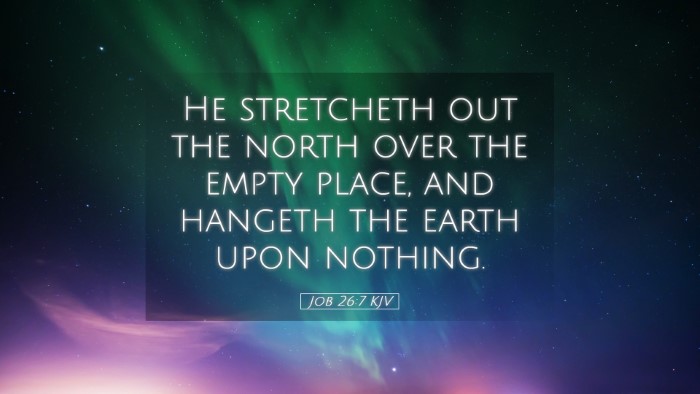Old Testament
Genesis Exodus Leviticus Numbers Deuteronomy Joshua Judges Ruth 1 Samuel 2 Samuel 1 Kings 2 Kings 1 Chronicles 2 Chronicles Ezra Nehemiah Esther Job Psalms Proverbs Ecclesiastes Song of Solomon Isaiah Jeremiah Lamentations Ezekiel Daniel Hosea Joel Amos Obadiah Jonah Micah Nahum Habakkuk Zephaniah Haggai Zechariah MalachiJob 26:7
Job 26:7 KJV
He stretcheth out the north over the empty place, and hangeth the earth upon nothing.
Job 26:7 Bible Commentary
Commentary on Job 26:7
Verse: Job 26:7 - "He stretches out the north over empty space; He hangs the earth on nothing."
Introduction
This verse reflects the grandeur of God's creation and His sovereign control over the universe. Job's declaration is a powerful reminder of the majesty and mystery of God's creative power. In the context of Job’s discourse, it offers profound theological insights into both the nature of God and the position of man within His universe.
Verse Analysis
As we delve into Job 26:7, it is essential to consider the historical and literary context of the Book of Job. The patriarch Job, amid great suffering, articulates a cosmic perspective that underscores God’s omnipotence. Job’s words echo a profound theological truth: God is the Creator who maintains all creation, even in the face of human despair.
Theological Implications
- The Sovereignty of God: The imagery of God stretching out the north over empty space illustrates His sovereign rule over creation. This metaphor suggests that the universe is established not on any physical support but by the will of God alone.
- Creation Ex Nihilo: The phrase "hangs the earth on nothing" encapsulates the concept of creation out of nothing. This is a critical doctrine in Christian theology, emphasizing God's authoritative command in bringing forth existence itself.
- The Cosmic Order: Job’s assertion speaks to the orderliness of the universe, which operates under God’s sovereign guidance. This reflects a belief that all creation is intricately designed and maintained by divine providence.
Commentaries Insights
Matthew Henry’s Commentary
Matthew Henry emphasizes the majesty and omnipotence of God as displayed in creation. By stretching the northern skies, God demonstrates that He has dominion over all. Henry points out that the vastness of space signifies God's infinite power while serving as a reminder of humanity’s frailty. He concludes that reflecting on creation invites humility and reverence before the Lord.
Albert Barnes’ Notes
Albert Barnes highlights the poetic nature of Job's description. He notes that Job’s statement offers a vivid illustration of God's omnipotence as He suspends the earth in space, suggesting perfect balance and order. Barnes stresses that such imagery provides comfort and assurance about the divine control over chaos and darkness, especially pertinent to Job's sufferings and questioning of God’s justice.
Adam Clarke’s Commentary
Adam Clarke delves into the scientific aspects of Job’s language, linking it to the cosmological understanding of the universe. Clarke interprets the "empty space" as evidence of God’s creative might, while also drawing parallels to contemporary scientific views regarding the noetherian framework of atoms and gravity. Clarke’s insights serve to bridge faith and reason, affirming that true understanding of creation ultimately leads back to God.
Application for Ministry
The implications of Job 26:7 are significant for ministry and theological education. For pastors and teachers, this verse presents an opportunity to emphasize God’s sovereignty in the lives of believers. Here are some practical applications:
- Encouragement in Suffering: Just as Job reflects on God’s grandeur in the face of his trials, ministers can remind their congregations that God’s omnipotent control over the universe extends to personal tribulations.
- Creation and Worship: This verse provides a foundation for worship, calling believers to marvel at God’s creations and to respond in awe and adoration.
- Theological Education: Educators can use Job 26:7 as a springboard into discussions about the nature of God, creation, and humanity's place within the cosmos, encouraging deeper understanding and critical thinking.
Conclusion
Job 26:7 stands as a testament to the limitless power of God and the delicate balance of creation. Through insights from public domain commentaries, we glean a rich tapestry of theological truths that reinforce God’s majesty and our response to it. As believers, contemplating such profound truths fosters a deeper faith and a more profound commitment to glorifying God in all aspects of life.


